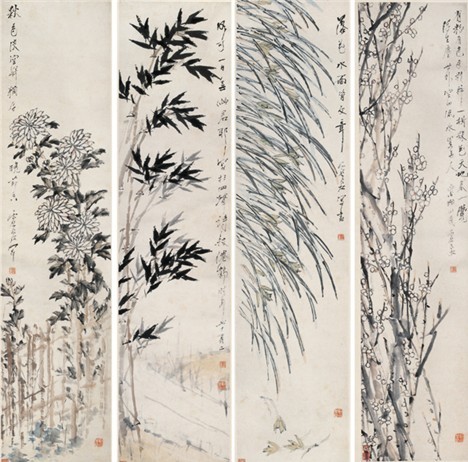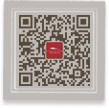- 中文
- EN
- Français
- 日本語
- 한국어
- 繁體中文
Hangzhou Museum Displays Xiling Society’s Precious Seals

"Plum, Orchid, Bamboo, Chrysanthemum” by Xu Gu of the Qing Dynasty
Xiling Seal Society, located on Solitary Hill of West Lake in Hangzhou, is China’s first and largest academic society of seal-related learning and arts. It boasts a couple of seal-related buildings and natural caves on the hill, and attracts streams of tourists every day.
This year is the 110th anniversary of the society’s establishment. It is holding a free exhibition displaying collections of rare seals in the Hangzhou Museum through November 28.
The exhibition revolves around donated seals, mainly contributed by society members from home and abroad and deceased literati captivated by seal arts.
China has a centuries-old, rich culture of seal arts, which was reflected on the logo of 2008 Beijing Olympic Games — depicting a Chinese seal inscribed with the Chinese character ¾©, from the name of Beijing.
Early in the Warring States Period (476-221 BC), Chinese people started to use stones, gold and ivory to carve characters. The royal court and officials applied the seals on documents as a kind of authentication, while common residents used a seal instead of a signature.
In the Yuan Dynasty (1271-1368), the most famous seal artist was Wang Mian, who was a Zhejiang native and one of China’s greatest calligraphy masters. Wang first used soapstone in seal carving.
The Ming Dynasty (1368-1644) and Qing Dynasty (1644-1911) were boom times for seal art, especially in the southern region of Yangtze River Delta, where there’s a continuous, deep tradition of humanities and arts.
Through the dynasties, characters on seals took on varied forms, which provided experts with evidence of how the Chinese characters evolved.
Also, the handles of seals made by masters feature exquisite patterns and shapes, which reflected the level of Chinese art at the time. To protect the precious seal art, the UNESCO listed it as world intangible heritage in 2009.
Before the establishment of the society, there were three schools of seal arts in China, namely Zhe (Zhejiang Province) school, Hui (Anhui Province) school and Hai (Shanghai) school.
Each school had enlisted small groups of artists, especially in Zhejiang and Shanghai. However, they were not formally registered nor recognized by the government.
In 1904, Ding Ren, Wang Shi, Wu Yin and Ye Ming, four artists of Zhe school, founded Xiling Seal Society as a national and academic society. After 110 years of development, the society has become a recognized art society focusing on seal collection.
Accomplished past members of the society included Wu Changshuo, Li Shutong, Huang Hongbin and Sha Menghai. They were great calligraphers, seal makers and painters who garnered fame and were highly regarded in history.
Since its establishment, the society has upheld the motto of “protecting seals and researching seals.” Xiling Seal Society is now considered the promised land by those who are dedicated to seals. It boasts a collection of 16,000 seals, among which 126 are ranked as top-class national cultural relics.
Most of the society’s collections were donated by the society’s members. In 1962, Zhang Lu’an contributed 1,220 seals he had collected to the society before he passed away.
In 2003, a Japanese member found a valuable seal made by Wu Changshuo at an auction and purchased it to give it to the society.
At present, the society has 40 members around the world, including seal hobbyists in Japan, South Korea, France, Switzerland, Malaysia and Singapore.
The society is using the anniversary to call on members to create new seals using the Xiling Seal Society as a theme. All of the materials to make seals are donated by the Bloodstone Industry Commission of Lin’an County.
Bloodstone is regarded as one of the best materials for engraving seals. Zhexi Canyon in Lin’an County abounds in this uncommon stone, which gives the society a source of quality materials close by.
The exhibition also includes valuable calligraphy, paintings and stone inscriptions.
Date: Through November 28 (closed on Mondays)
Address: No. 18, Liang Dao Shan
Tel: (0571) 8780-2660



